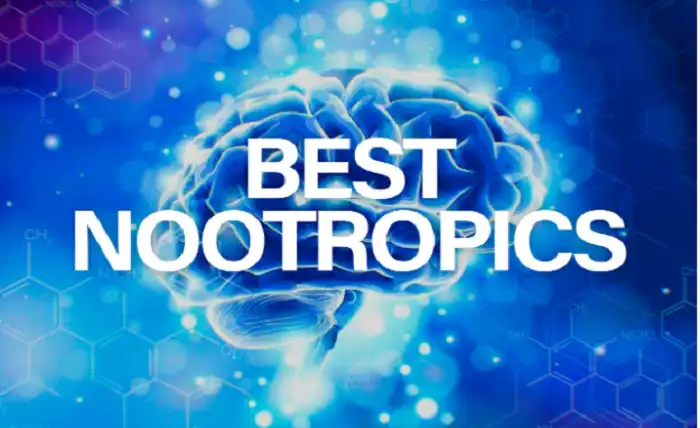Unleash Your Brain with Nootropics: How to Boost Your Cognitive Performance with Smart Drugs

Do you ever wish you could improve your memory, focus, creativity, or intelligence? Do you ever struggle with mental fatigue, stress, or brain fog? If so, you might be interested in nootropics, also known as smart drugs or cognitive enhancers. Unleash Your Brain with Nootropics, Nootropics are substances that can enhance your brain function and performance in various ways.
What are nootropics?
Nootropics are natural or synthetic substances that can improve your mental performance in healthy people. They have gained popularity in today’s highly competitive society and are most often used to boost memory, focus, creativity, intelligence, and motivation. The term nootropic was coined by Romanian psychologist Corneliu. Giurgea in 1972, defined it as a substance that enhances learning and memory, protects the brain from damage, and has few or no side effects.
Nootropics can be classified into different categories, such as:
- Stimulants: These are substances that increase your alertness, energy, and attention by stimulating your central nervous system. Examples include caffeine, nicotine, modafinil, and methylphenidate.
- Cholinergic: These are substances that increase your levels of acetylcholine, a neurotransmitter that is involved in memory, learning, and cognition. Examples include choline, alpha-GPC, citicoline, and acetyl-L-carnitine.
- Racetams: These are synthetic compounds that modulate various neurotransmitters and receptors in your brain, such as glutamate, acetylcholine, and dopamine. Examples include piracetam, aniracetam, oxiracetam, and phenylpiracetam.
- Adaptogens: These are natural herbs or plants that help your body adapt to stress and balance your hormones. Examples include ginseng, ashwagandha, rhodiola rosea, and bacopa monnieri.
- Serotonergics: These are substances that increase your levels of serotonin, a neurotransmitter that is involved in mood, emotion, and sleep. Examples include 5-HTP, tryptophan, L-theanine, and St. John’s wort.
- Dopaminergics: These are substances that increase your levels of dopamine, a neurotransmitter that is involved in motivation, reward, and pleasure. Examples include L-tyrosine, L-dopa, mucuna pruriens, and phenylalanine.
These are some of the most common types of nootropics, but there are also others that have different mechanisms of action or effects on the brain.
How do nootropics work?
Nootropics work by influencing various aspects of your brain function and performance, such as:
- Neurotransmission: This is the process of communication between neurons (brain cells) using chemical messengers called neurotransmitters. Nootropics can increase or decrease the levels, release, reuptake, or breakdown of certain neurotransmitters, such as acetylcholine, glutamate, dopamine, serotonin, and norepinephrine.
- Neurogenesis: This is the process of creating new neurons or brain cells. Nootropics can stimulate or support neurogenesis by providing the necessary nutrients, hormones, or growth factors for the growth and development of neurons.
- Neuroplasticity: This is the ability of the brain to change its structure and function in response to experience or learning. Nootropics can enhance neuroplasticity by increasing the formation or strengthening of synaptic connections between neurons, which are the basis of memory and learning.
- Neuroprotection: This is the ability of the brain to protect itself from damage or degeneration caused by various factors, such as aging, injury, infection, or toxins. Nootropics can provide neuroprotection by reducing inflammation, oxidative stress, or apoptosis (cell death) in the brain.
By affecting these processes, nootropics can improve various aspects of your cognitive performance, such as:
- Memory: This is the ability to store and recall information. Nootropics can improve memory by enhancing the encoding, consolidation, retrieval, or recall of information.
- Focus: This is the ability to concentrate on a specific task or stimulus. Nootropics can improve focus by increasing alertness, attention span, or mental clarity.
- Creativity: This is the ability to generate novel or original ideas or solutions. Nootropics can improve creativity by stimulating divergent thinking, associative thinking, or insight.
- Intelligence: This is the ability to acquire and apply knowledge and skills. Nootropics can improve intelligence by enhancing reasoning, problem-solving, or decision-making abilities.
- Motivation: This is the drive or desire to pursue a goal or reward. Nootropics can improve motivation by increasing dopamine levels, which are linked to reward and pleasure.
What are some of the best nootropics to try?
There are many nootropics available on the market, but not all of them are equally effective or safe. Some of them may have side effects, interactions, or contraindications that you should be aware of before using them. Therefore, it is advisable to consult your doctor before taking any nootropic, especially if you have any medical condition or are taking any medication.
That being said, here are some of the best nootropics that have been proven by scientific research or anecdotal evidence to enhance your cognitive performance:
- Caffeine: This is the most widely consumed psychoactive substance in the world and the most common nootropic. It works by blocking adenosine receptors in your brain, which makes you feel less tired and more alert. It can also increase dopamine and norepinephrine levels, which can boost your mood and motivation. Caffeine can improve your focus, attention, and reaction time, especially when you are fatigued or sleep-deprived. However, it can also cause anxiety, jitters, insomnia, or tolerance if taken in excess or too late in the day. The recommended dose of caffeine is 40–300 mg per day.
- L-Theanine: This is an amino acid found in tea that can have a calming effect on your brain without causing drowsiness. It works by increasing alpha waves in your brain, which are associated with relaxation and creativity. It can also increase serotonin and GABA levels, which can reduce stress and anxiety. L-Theanine can enhance the effects of caffeine by reducing its negative side effects and creating a synergistic effect on cognition. The recommended dose of L-Theanine is 200 mg per day.
- Creatine: This is an amino acid that your body uses to make energy for your cells. It is mainly found in meat and fish, but it can also be taken as a supplement. It works by increasing the availability of ATP (adenosine triphosphate), which is the main energy source for your brain cells. Creatine can improve your short-term memory and reasoning skills, especially if you are vegetarian or under stress. The recommended dose of creatine is 5 grams per day.
- Bacopa Monnieri: This is a herb that has been used in Ayurvedic medicine for centuries to enhance memory and learning. It works by increasing the levels of acetylcholine and serotonin in your brain, which are involved in memory formation and mood regulation. It can also reduce oxidative stress and inflammation in your brain, which can protect it from damage or degeneration. Bacopa Monnieri can improve your memory, attention, and mood, especially if you have cognitive impairment or depression. The recommended dose of Bacopa Monnieri is 300 mg per day.
- Lion’s Mane Mushroom: This is a mushroom that has been used in traditional Chinese medicine for its neuroprotective and neuroregenerative properties. It works by stimulating the production of nerve growth factor (NGF), which is a protein that promotes the growth and survival of neurons. It can also modulate various neurotransmitters and receptors in your brain, such as glutamate, acetylcholine, and dopamine. Lion’s Mane Mushroom can improve your memory, cognition, and mood, especially if you have neurodegenerative diseases such as Alzheimer’s or Parkinson’s. The recommended dose of Lion’s Mane Mushroom is 500–1000 mg per day.
Conclusion
Nootropics are substances that can enhance your brain function and performance in various ways. They can improve your memory, focus, creativity, intelligence, and motivation by influencing various aspects of your brain function, such as neurotransmission, neurogenesis, neuroplasticity, and neuroprotection. However, not all nootropics are equally effective or safe, so you should do your research and consult your doctor before taking any nootropic. Some of the best nootropics that you can try are caffeine, L-Theanine, creatine, Bacopa Monnieri, and Lion’s Mane Mushroom.




